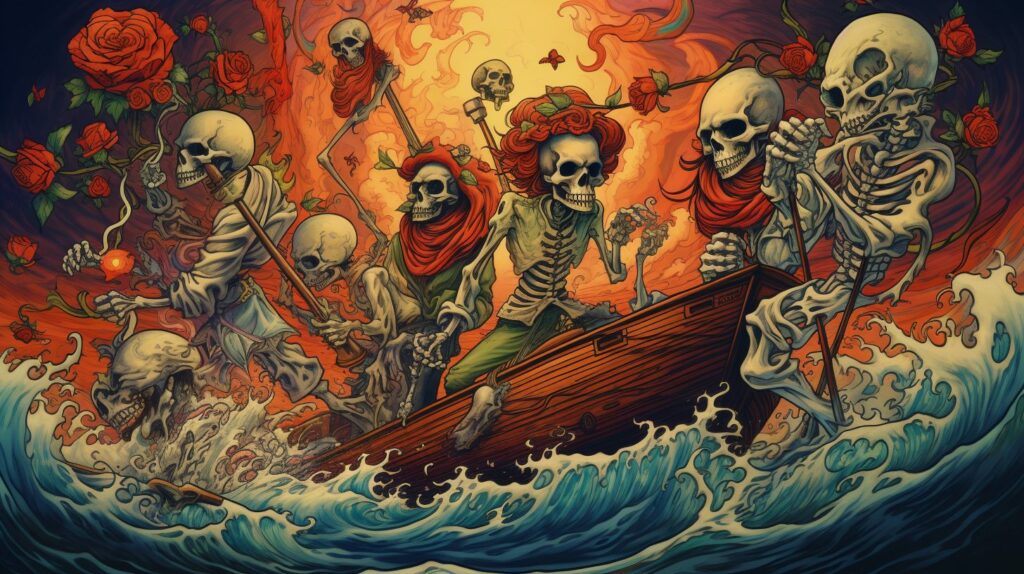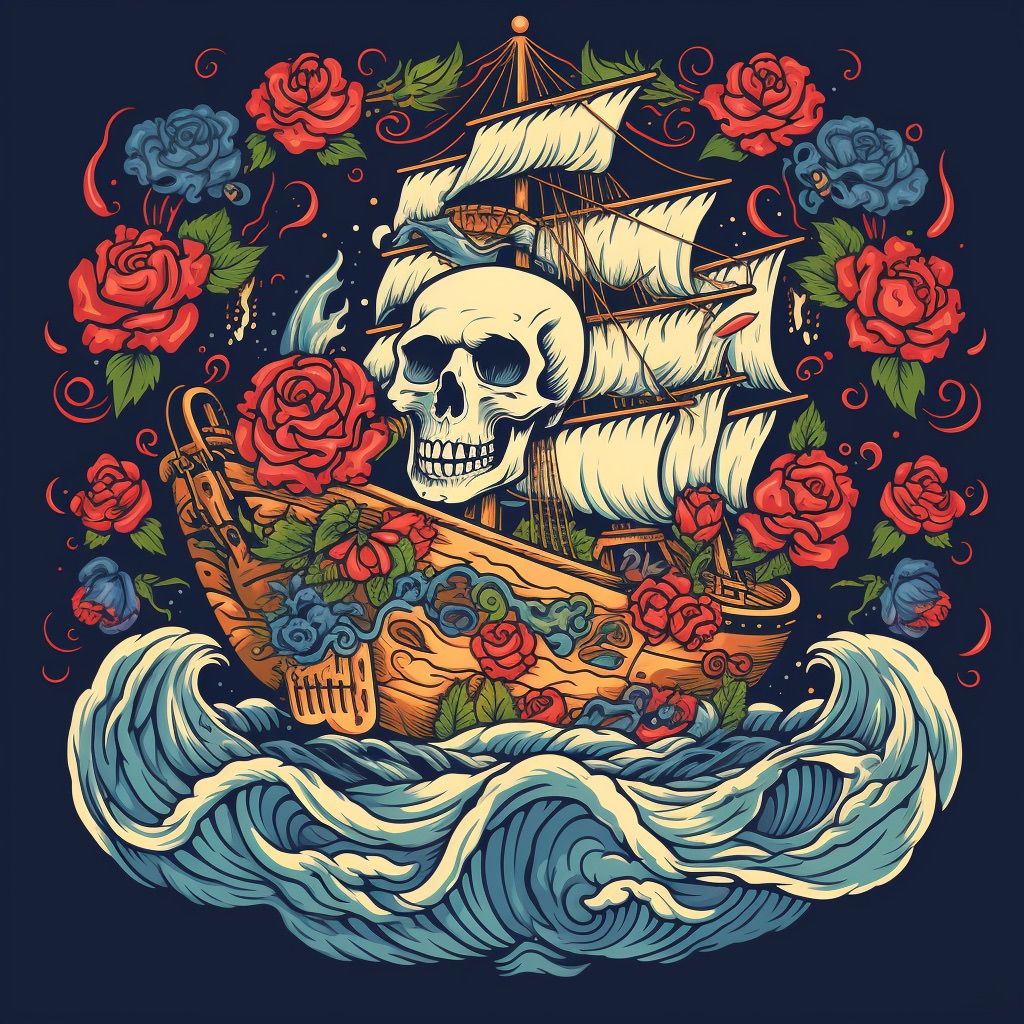The Meaning of the Grateful Dead’s “Ship of Fools”

The Grateful Dead’s “Ship of Fools” is a powerful ballad that examines man’s place in society, and encourages those with the power to seek something greater to go and seek it. It has implications on many of society’s inner-workings, touching upon the concept of groupthink, individuality, and learning from your enemy, so you can defeat them.
Written by lyricist Robert Hunter in collaboration with guitarist Jerry Garcia, “Ship of Fools” is one of the finest compositions in a sea of fine compositions. This is a slightly biased opinion, coming from a strange captain who loves the Grateful Dead, but there are many that would agree my opinion holds a lot of water.
Okay, I didn’t come here to write puns about “Ship of Fools”. Today we’re going to examine this iconic song and find out what puts the wind in the sails of this song, which was released on the 1974 studio album From The Mars Hotel.
Grateful Dead – First “Ship of Fools” (2/22/74)
First performed by the Grateful Dead live on February 22nd, 1974, during show that also featured the debut of “U.S. Blues” and “It Must Have Been The Roses”, “Ship of Fools” found a steady home as an uncommon, but wholly welcome addition to any show in any given era.
The first “Ship of Fools”:
“Ship of Fools” Origins
Robert Hunter was known for including a range of influence in his songwriting, and this song brings a long line of allegorical reference points. While he never spoke directly of these things as influences, connecting the dots makes the song even more powerful.
The Allegory of the Ship of Fools
For “Ship of Fools” we think mainly of the allegory of the ship of fools from Plato’s Republic, as the basis for the 15th-century book Ship of Fools by Sebastian Brant. Brant’s book contains 112 satirical stories that depict the allegory in its most famous form.
This allegory also inspired the famous painting by Hieronymus Bosch, “Ship of Fools”, which hangs in the Louvre in Paris.
My understanding of this story, in as plain of English as I can possibly muster, is as follows.
What does “Ship of Fools” Mean?
The allegory tells of a crew who mutinies to overthrow their strict, aging captain. After successfully commandeering the ship, chaos ensues as they first live foolishly, drinking and partying as they go. Eventually, there comes a time when the most capable sailor must step up to steer the ship.
This brings us to the crux of the allegory. Will the most capable sailor end up in charge of the ship, or will he be laughed off in favor of the loudest, most convincing fool on board?
Of course, this in itself is an allegory for society at large, and the groupthink tendency to sometimes ignore the smartest, albeit most humble voices in the room.

“Ship of Fools” Lyrics Meaning
Now that we have the basic literary context set, we can examine Robert Hunter’s contribution to this ongoing story via the lyrics to the Grateful Dead song, “Ship of Fools.”
Starting with the first verse:
Went to see the captain, strangest I could find
First verse to “Ship of Fools” by the Grateful Dead.
Laid my proposition down, laid it on the line
I won’t slave for beggar’s pay, likewise gold and jewels
But I would slave to learn the way to sink your ship of fools
The thought of looking for the “strangest” captain means that he is looking for an open-minded leader. Or, at least the most open-minded leader available, before whom he will lay down his appeal.
He won’t work for low pay, nor will he work for high pay. His goal are much loftier than that.
Our narrator wants to learn the ropes, so he can take over the ship and become the new leader. He wants to become the most capable navigator, so he can sink the “ship of fools”, meaning, the cruelty and hatred that exists in the world.
The chorus is next, with more elaboration on this:
Ship of fools on a cruel sea
Chorus to “Ship of Fools” by the Grateful Dead.
Ship of fools sail away from me
It was later than I thought when I first believed you
Now I cannot share your laughter, ship of fools
The sea, or the world, is cruel, and the ships that sail upon it are caught up in foolish vices and selfish notions. Our narrator wants no part of this, perhaps meaning no part of the political world, telling the foolish ships to get away.

He expresses regret that he believed their lies for so long, but now that he can see the light he no longer wants anything to do with them.
Saw your first ship sink and drown, from rocking of the boat
Second verse to “Ship of Fools” by the Grateful Dead.
And all that could not sink or swim was just left there to float
I won’t leave you drifting down but whoa it makes me wild
With thirty years upon my head
To have you call me child
This verse brings a lot of anger to the surface. First, the narrator points out the mistakes of his elders, who sunk the ship from “rocking of the boat”. This means they quarreled and fought their way into death, and the defenseless were left without a helping hand.
It’s easy to think of the political implications of that line, applied to the wars and turmoil of society, and the leaders who bring about this destruction.
Now, as our narrator learns the ways to lead, he considers whether he will leave them helpless when he takes over the ship. He says its tempting, but he’s better than that. He just wishes they wouldn’t look down upon him, and talk to him like a child, at 30 years of age now.
The chorus hits again, and then Garcia sings the third verse:
The bottles stand as empty
Third verse to “Ship of Fools” by the Grateful Dead.
As they were filled before
Time there was and plenty
But from that cup no more
Though I could not caution all
I still might warn a few
Don’t lend your hand to raise no flag atop no ship of fools
Hunter’s lyrics in this verse touch upon a common thread that runs through many of his songs, which is the inevitable passing of time. All of the bottles have been drained. There used to be plenty of time, but now there’s nothing to show for it.
It’s almost a warning against destruction and the foolish ways of man brought to light by this song. Hunter suggests that if his warnings are not heeded, only desolation will remain.
He understands that he can’t reach everybody, but he hopes that some will hear his pleas. The least they can do, is not get involved in promoting the foolish ideas of our cruel world leaders.
Conclusion
Overall, “Ship of Fools” becomes an encouraging song for listeners, to stay the course of righteousness in their own lives and not give in to the temptations of any “ship of fools” that may pass them by. They should lead by example, and learn the ways of their enemies so they can out-sail them and gather the influence required to make a positive impact on society.
Grateful Dead – “Ship of Fools” (From the Mars Hotel, 1974)
“Ship of Fools” Live Versions
As I mentioned earlier, “Ship of Fools” was somewhat of a rarity during Grateful Dead live shows, but when it did show up, it often made a profound impact. I’ve included a few of my favorites here.
“Ship of Fools” (6/28/74)
Dick’s Picks Volume 12. The best Dick’s Picks? My most-listened “Ship of Fools”.
“Ship of Fools” (10/16/74)
“Ship of Fools” (7/8/78)
This whole show is really fun for anybody who wants to hear a time when Jerry’s really feeling it. Let’s be real. We all want to hear a time when Jerry’s feeling it. That’s what we’re here for. Am I right?
“Ship of Fools” (3/28/81)
Pro-shot version from 3/28/81. This show also contains one of the most famous versions of “Shakedown Street”.
“Ship of Fools” (7/16/90)
Another solid version captured on video, from later in the band’s career. The summer of 1990, Brent’s final tour.